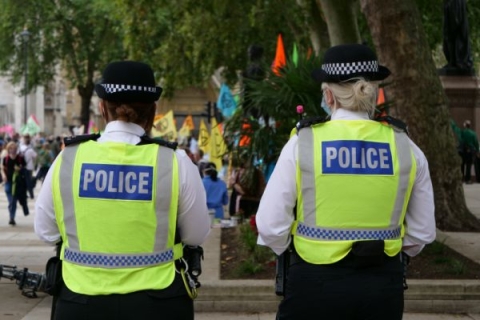

The team of researchers conducted a public survey during the lockdown periods between July and September 2020, finding that the general public wanted lockdown restrictions to be more strictly enforced
30 June 2021
5 min read
New research from the University of Portsmouth highlights a widespread belief amongst the general public that levels of compliance to lockdown restrictions has been very poor and that police should be stricter.
The team of researchers, led by Dr Sarah Charman, Reader in Criminology, conducted a public survey during the lockdown periods between July and September 2020.
The survey had four open-ended questions, where respondents were asked to describe their interactions with the police during lockdown and how they perceived they were managing to ensure overall compliance. The responses suggest the public has shifted its thinking towards a desire for stricter forms of policing.
- 31 percent of respondents question how fairly the police have applied the restrictions, believing that the police are being too lax on rule breakers in the main
- 25 percent of respondents want to see more police patrolling the streets – visibility is seen as key to effective policing of the Covid-19 restrictions
- 20 percent of respondents believe that government guidelines on restrictions have been unclear, which has negatively affected their perceptions of the police response
The study also found that respondents reported good individual compliance with restrictions, but there is widespread belief that the compliance levels of the general public are very poor.
Dr Charman says: “Although the disparity between the public's conception of their own compliance with lockdown restrictions and that of the wider public is noteworthy in itself, the impact this sentiment is having on the public’s perceptions of the use of police powers during the pandemic has the potential to change the policing landscape forever.”
It is possible that this need for a heightened police presence is motivated by the general anxiety created by the pandemic. Many respondents viewed a visual police presence as reassuring
Dr Aram Ghaemmaghami, Research Associate
The open-ended responses also hinted that the lack of police visibility is an area of concern, with a quarter of comments requesting more police patrols in public places. The study showed respondents felt that visibility was key to policing rule breakers, where the police “need to be visible and accessible to control those who ignore the rules.”
Dr Aram Ghaemmaghami, Research Associate, University of Portsmouth said: “It is possible that this need for a heightened police presence is motivated by the general anxiety created by the pandemic. Many respondents viewed a visual police presence as reassuring, with statements such as “visibility leads to feelings of security” being commonly made by respondents. Eleven percent of open-ended responses directly referenced their anxiety about the ability of the public to keep to the restrictions and how they viewed the police's role in managing that – with respondents reporting that they felt the police were being “too lenient” when policing restrictions.”
As we tentatively step out of the latest lockdown and the vaccination programme continues to be rolled out, we need to gain a better understanding of the longer term implications caused by the pandemic and the rapidly changing policy environment it has created
Dr Sarah Charman, Reader in Criminology
Lockdown fatigue is cited as another possible reason the public desire stronger policing, where they have become “tired of having to self-police.” There were hundreds of comments made that advocated for much stricter enforcement – where “the kid gloves should be put away and boots should be used.”
Dr. Ghaemmaghami explains: “As alarming as some of these statements may seem in isolation, it is important to note that 20% of responses did illustrate an empathy towards the police and the “impossible job” they have been given in terms of policing the pandemic, illustrating an understanding that the “guidelines around enforcing lockdown were not clear to the police.” This would suggest that the police still possess the cultural capital needed to pursue more traditional methods of policing that focus on de-escalation, such as the use of the four E’s - Engage, Explain, Encourage, Enforce.”
Dr Charman says: “It appears that the pandemic has changed the way the public view the application of policing powers, requesting stronger enforcement instead of engagement strategies. As we tentatively step out of the latest lockdown and the vaccination programme continues to be rolled out, we need to gain a better understanding of the longer term implications caused by the pandemic and the rapidly changing policy environment it has created.”
